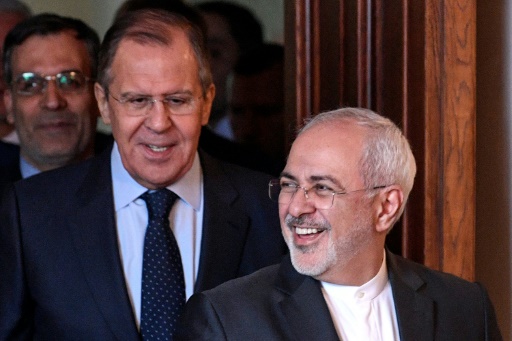Moscow (AFP) – Iran’s foreign minister was in Moscow on Monday as Russia tries to keep the Iran nuclear deal alive in the wake of Washington’s pull-out, pushing it into rare cooperation with Europe.
Iranian state television Irib broadcasted images of Mohammad Javad Zarif in Moscow, saying he had arrived in Russia at 4am (01:00 GMT) on Monday and was due to meet Russian foreign minister Sergei Lavrov.
A Russian foreign ministry spokesman confirmed the pair would meet Monday morning.
Zarif’s diplomatic tour took him to Beijing at the weekend and will see him visit Brussels later in the week, as the international backers of the 2015 accord scrabble to save it.
After meeting his Chinese counterpart on Sunday, Zarif said he was hopeful of forging a “clear future design” for the accord.
Russian President Vladimir Putin has already spoken with Germany’s Angela Merkel and Turkey’s Recep Tayyip Erdogan about the efforts, after voicing his “deep concern” over US President’s Donald Trump’s decision.
Trump’s move to ditch the nuclear deal has infuriated Washington’s allies in Europe as well as China and Russia.
“(European) cooperation with Russia, which until recently seemed impossible because of the Skripal (spy poisoning) case, with the expulsion of diplomats and the reduction of contact, is now receiving a fresh boost,” consultant Andrei Baklitski of the PIR Center NGO said.
“The Europeans, after the withdrawal of the US from the deal, have found themselves forced to save the Joint Cooperative Plan of Action themselves,” he added.
Moscow would have to play a key role in ensuring Tehran does not resume its nuclear programme, he said.
On Sunday US Secretary of State Mike Pompeo said Washington still wants to work with Europe to counter Iran’s “malign behaviour”.
But while Pompeo talked up the prospect of renewed coordination with America’s allies, another top aide reminded Europe its companies could face sanctions if they continue to do business with the Middle Eastern power.
– Russia key regional player –
Russian efforts to save the accord will boost its role as a power-player in the Middle East, after its intervention on the side of Bashar al-Assad’s regime in Syria.
This, along with its diplomatic moves to orchestrate an end to the conflict, has put Moscow at loggerheads with the US and Europe, which have intervened against the regime.
Zarif will meet his Russian counterpart Sergei Lavrov, according to Iran’s foreign ministry.
Merkel is set to visit Russia and meet Putin for a working visit in the Black Sea resort of Sochi on Friday, while French President Emmanuel Macron will be in Saint Petersburg later in the month for an economic forum.
Putin will also meet Yukiya Amano, the head of the International Atomic Energy Agency in Sochi, presidential aide Yury Ushakov said.
Iran has said it is preparing to resume “industrial-scale” uranium enrichment “without any restrictions” unless Europe can provide solid guarantees that it can maintain trade ties despite renewed US sanctions.
After long negotiations, Iran had agreed in July 2015 to freeze its nuclear programme in return for the lifting of punishing international sanctions.
The deal was negotiated between Iran and the five permanent members of the UN Security Council — Britain, China, France, Russia and the United States — plus Germany.
Russia and Iran once had difficult relations but have seen ties improve since the end of the Cold War.
While Tehran was shunned by the international community in the 1990s, Moscow agreed to resume the construction of the Bushehr Iranian nuclear plant that Germany had abandoned.
Russia and Iran also sought to strengthen their business ties long before the 2015 agreement, despite international sanctions in place.
Analysts have suggested Russia could benefit economically from the US pull-out, as it is less exposed to the consequences of renewed sanctions than Europe.
Featured photo: AFP / Alexander NEMENOV. Russian Foreign Minister Sergei Lavrov (left) and his Iranian counterpart Mohammad Javad Zarif met last month in Moscow. The two men are expected to meet again Monday to discuss how to salvage the Iran nuclear accord after Washington pulled out.



 © 2025 All Rights Reserved
© 2025 All Rights Reserved